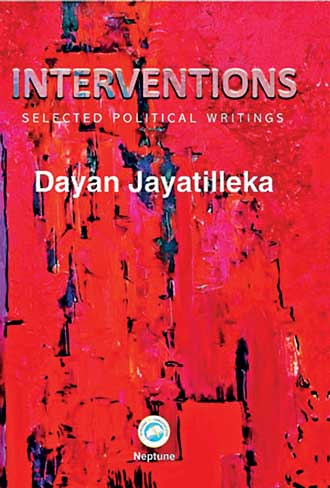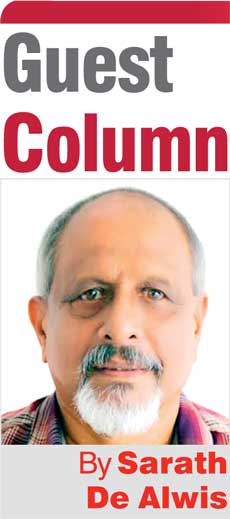Sunday Feb 15, 2026
Sunday Feb 15, 2026
Saturday, 18 May 2024 00:04 - - {{hitsCtrl.values.hits}}

“Until they become conscious, they will never rebel, and until after they have rebelled, they cannot become conscious.”
― George Orwell
 This is a review (perhaps imprecise) of the anthology “Interventions” – Selected Political Writings of Dayan Jayatilleka edited by Uditha Devapriya and Uthpala Wijesuriya with a forward by Kamaya Jayatissa, published by Neptune.
This is a review (perhaps imprecise) of the anthology “Interventions” – Selected Political Writings of Dayan Jayatilleka edited by Uditha Devapriya and Uthpala Wijesuriya with a forward by Kamaya Jayatissa, published by Neptune.
I say imprecise, because I wrote this review before reading the entirety of this collection of writings by Dayan J. When reading this missive I hope you will understand why I hurried to pen this review before digesting it in its whole.
Dayan Jayatilleka as a public intellectual has been rediscovered by two millennial opinion journalists – the type who seek the narrative that’s alternative to that of the mainstream.
I must declare my interest. I know Dayan since 1968 as the son of Mervyn De Silva who was my Editor at Ceylon Daily News. Mervyn was my friend and a mentor of sorts.
In university, as a student of Political Science Dayan excelled. He made his parents proud.
During our “Pinochet” years 1977-1989 Dayan was the quintessential youth in revolt. “No matter how hopeless or bleak things can seem, as long as I have breath in my body, I shall make trouble for the tyrant in saddle.”
He turned underground activist. Readers must forgive me. A review of Dayan’s ‘Interventions’ needs context. Long years after, he explained those bleak years of protest and struggle.
“What was wrong was the ideology, the model and an arrogantly authoritarian style of governance marked by coercive violence. From the perspective of contemporary history, those ten years mark the attempt of a Westernized ruling elite to arrogantly force through a capitalist modernisation from above by imitating and imposing an authoritarian model drawn from East Asia during the Cold War.” (How to hold out: Lessons from a Labyrinth)
The serious public thinker, the authentic intellectual is neither a pacifier nor a consensus-builder. Such public intellectuals’ disdain easy formulas and the ready-made cliché. As Edward Said put it succinctly challenging the powerful and the conventional is their essential mission in public discourse.
Uditha Devapriya and Uthpala Wijesuriya editors of the anthology and Kamaya Jayatissa who writes the forward were born long after those terribly traumatic years during which, the cataclysmic climax was India’s ‘military intervention’.
A new generation has discovered Dayan Jayatilleke the public thinker. Therein lies the dominant substance of the anthology – “Interventions.”
I have identified them as Opinion Journalists. Opinion journalists write opinion pieces. They question contemporary dominant narratives. Born long after the ‘Pinochet’ years of Sri Lanka 1977-1989, their generation should be equipped to read history in hindsight. To that end ‘Interventions’ serves a historical purpose.
I am not familiar with Uthpala Wijesuriya’s writing so much. I regularly read Uditha Devapriya. Hence my intrepid categorisation of the two as opinion journalists.
More than a review, this is an attempt to locate the ‘magic’ that compelled the two editors of the anthology and the writer of its Forward.
Years after his activism Dayan distinguished himself as a consummate ambassador in Geneva, Paris, and Moscow.
As some of his writings in the anthology testify, he consistently retained his roost as a combative voice holding politicians and institutions accountable.
The anthology offers a distilled essence of his varied commentaries demonstrating that he is driven only by ideas with not a hint of tribal warp.
I don’t agree with many of his political positions. But his ideas deserve recognition for the integrity they are founded on.
Amaya Jayatissa begins her forward quoting Albert Camus’s Myth of Sisyphus. “The only way to deal with an unfree world is to become so free that your very existence is an act of rebellion.” An eloquently germane resume of the protagonist subject.
Uditha Devapriya explains how he reads Dayan J. “He is neither a dogmatic critic of the West nor a profligate appeaser of it. He is a critic of unipolarity but is enough of a realist to know that we need to deal our cards correctly without putting all our eggs in to one basket. This is why and how he can cite not just Gramsci, and Mao, but also Kisinger and Schmitt.
If memory serves me kindly, I recall Dayan writing of the Melian dialogues! Given the velocity of winds in the gulf of Mannar revisiting Thucydides may not be a bad idea.
Uthpala Wijesuriya explains, “The fact that Jayatilleka has changed during his career is an often talked about subject. But the way he sees it, these shifts do not constitute change of direction.” If you think, you are entitled to change your thinking. Those who don’t change their thinking don’t think.
I came across some luminous passages in ‘Interventions’ on What is Marxism. Dayan affirms, as a ‘tool of thought’ and a ‘weapon of criticism’ Marxism remains unsurpassed. Marxism as a tool of thought is the wisdom of Truong Chinh a respected theoretician of the Communist party of Vietnam whose FDI strategies are cheered today by Dr. Harsha de Silva the leading Economic Medicine Man of the SJB. The Chapter on Marxism pages 193-246 climbs the arduous heights of Marxist thinking and to my simple mind reaches incredibly luminous heights.
The launch of the book was really an intergenerational symposium on “What’s to be Done?” with Dr. Sarath Amunugama the man from Kandy and Paris and aging yet agile comrade DEW Gunasekera imparting wisdom gathered, discovered, experienced.
Despite many diversions, old DEW seems to have come full circle. He pleaded for a centre left national recovery out of the labyrinth. He was with a sense of urgency repeating Marcel Proust. We don’t receive wisdom. We must discover it for ourselves after a journey that no one can take for us or spare us.